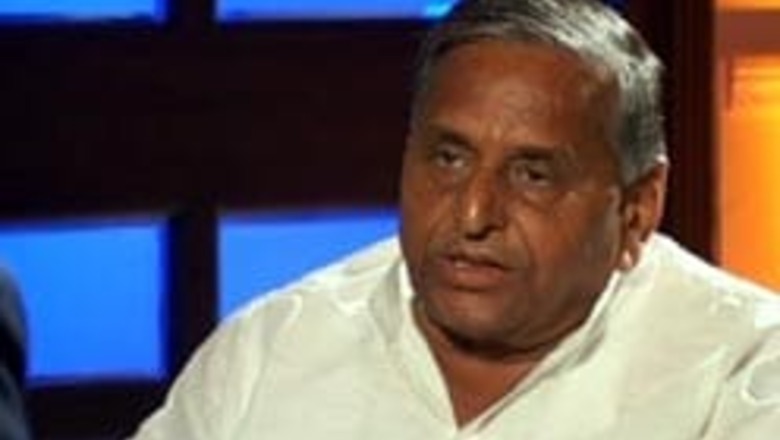
views
A fallacy informs much of the analysis of the performance of the Samajwadi Party. Everyone assumes that since the SP had won the last election and has lost this one, it is voters’ rage against the SP’s misrule, a vote against goonda raj, a comment on the company Mulayam Singh keeps etc. It is treated as yet another instance of anti-incumbency, a word that apparently needs no further explanation.
The trouble, of course, is that the SP did not ‘win’ the last election, nor did it lose popular support in this election. In the last election the SP won 143 seats on the basis of 25.4 per cent votes. This time its seats tally dropped to merely 97, while its vote share remained about the same as last time. In fact, it rose by a fraction to reach 25.5 per cent. This is not the routine anti-incumbency verdict we are so used to explaining away. There is a puzzle here.
In purely psephological terms, the puzzle—loss of seats without loss of votes—can be resolved very simply. In the first-past-the-post system, the number of seats a party wins does not depend only on its own votes; it depends on how others have performed. The system rewards the one who finishes first and punishes everyone else.
Last time the SP’s vote share appeared big compared to others, for it was placed 2.3 percentage points higher than its nearest rival. This time the same vote share appears small when compared to the BSP, which is placed five percentage points above it. The SP has not fallen behind; it has been overtaken.
This is what explains some of the big loss of seats for the SP in several regions. The SP lost most of its seats in Ruhelkhand, Doab and East. In each of these the party held on to or improved its vote share. The two regions where the SP lost some votes—West and North East—account for a loss of merely 10 seats for the SP.
PAGE_BREAK
A formal explanation like this begs the real political questions: why did the SP not fall behind? Why was it overtaken by the BSP? There is no evidence to support Mulayam Singh Yadav’s explanation that blamed the EC. Let us try out two more plausible responses.
SP’s votes
The first answer is a straight caste-based vote bank answer. You could say that the SP managed to hold on to its Yadav-Muslim vote banks, while every other caste polarised around the BSP in order to defeat the SP.
The evidence does not quite support this reading. Far from a simple retention, we get evidence of a lot of churn. Of those who voted for the SP in the last assembly elections, about one-third moved away this time, more than in the case of the BSP voters. The SP could retain only 44 of the 143 seats it won last time. The Yadav voters did support the SP as much as last time, more towards the latter half of the elections, but there was no additional polarisation as in the case of Jatavs for the BSP this time.
There is strong evidence of the erosion of Muslim vote for the SP by about 7 percentage points, from 54 per cent last time to 47 this time. The two regions of Poorvanchal — East and North East in our definition — that went to polls in the last two phases did witness some polarisation with about 62 per cent Muslims backing the SP. In the rest of the state the figure was merely 38 per cent.
The SP lost about two percentage point votes and 7 seats in the constituencies with high concentration of Muslim population. This election shows that Mulayam’s Muslim vote is not all that strong, especially if the Muslim voters do not fear the return of the BJP.
We must therefore consider an alternative explanation. SP’s ‘retaining’ the same share of votes as last time was a statistical coincidence, a net cancelling of two effects that worked in opposite directions. On the one hand, many of the SP’s micro-strategies of expanding its base —courting of upper castes, including Rajputs and Kurmis—did pay off.
The SP’s pre-poll smugness had some basis in reality. Also, many of the populist sops yielded some dividends: 15 per cent voters reported that someone from their family benefited from the unemployment allowance, 12 per cent reported benefiting from Kanya Vidya Dhan.
Mulayam did have an image of being strong on development, and not just among his supporters. But these gains were smaller than expected and were wiped out by his losses among the Muslims and the political polarisation that resulted from the severe indictment on law and order and corruption in the SP regime.
On this reading, the SP is more vulnerable than it might appear. Its core support from Muslims is open to poaching in the coming Lok Sabha elections. It does not have a strong auxiliary support from any other section of society. And the large proportion of transient votes may not stay, now that the trappings of power and patronage are no more with Mulayam. The SP is no doubt a strong regional force and here to stay, but it faces as tough a test from its own voters as it does from Mayawati’s government.




















Comments
0 comment